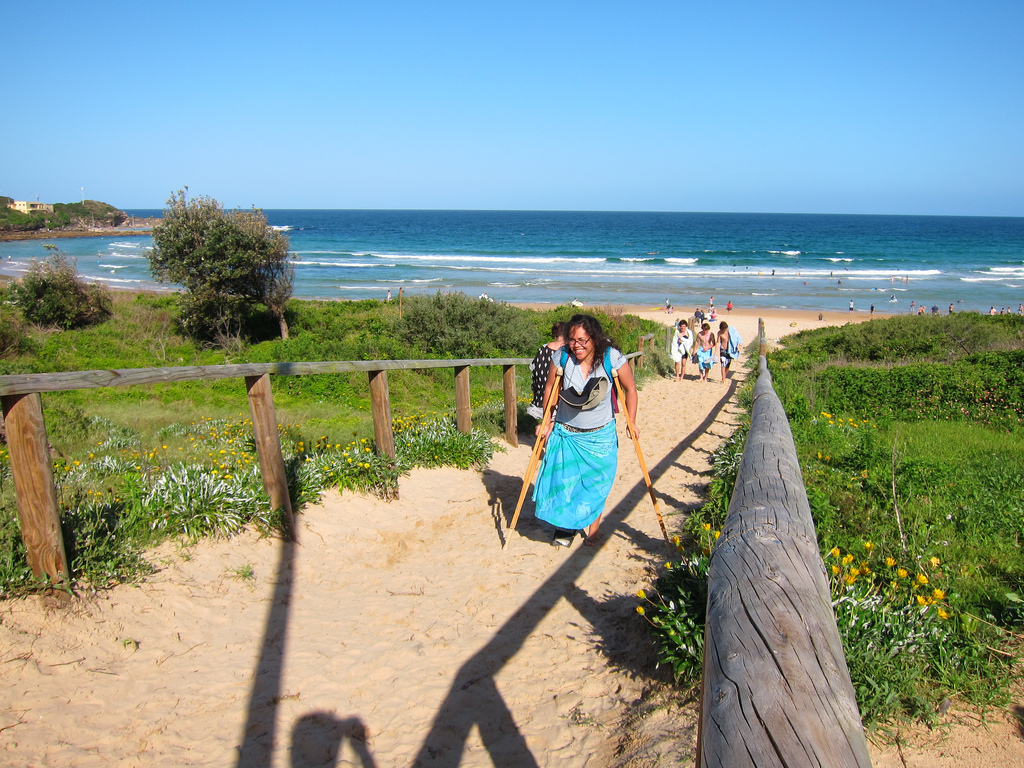He seemed, at first glance, to be an ordinary-looking middle-aged man engrossed in the mental gymnastics required to properly compare the prices of different brands of cornflakes by weight. But as I passed him in the aisle, one of my crutches made the clicking noise they sometimes do (when metal on top of metal on top of metal has weight added to it, science happens and it produces a sound) and his head spun around. He glared at me and, out of his mouth came the word I’ve grown to detest, the one I immediately knew he would spit at me in disgust: “scrounger”.
scrounger
noun
informal (derogatory)
a person who borrows from or lives off others.
“welfare scroungers”
| synonyms: | beggar, borrower, parasite, scrounge, cadger;
informal sponger, freeloader, junketeer; informal sorner; informal mooch, moocher, schnorrer; informal bludger “the unemployed are often depicted as scroungers” |
It’s not the first time this has happened to me. Hell, it’s not the first time in the last few months it’s happened to me. But every incident reinforces a staggeringly offensive attitude that is spreading through British society quicker than you can say ‘austerity measures’.
When it was the very drunk man in the city centre, he wanted to add as many derogatory words to the already offensive ‘scrounger’ as he could think of: “You f*cking lazy, freeloading, faking it, benefit cheat scrounger”, he yelled, a crescendo rising to a virtual loudhailer volume by the end of his sentence. When it was the older man who walked past me shouting “Benefits! Benefits! Benefits!” as I waited for a bus, I was with someone I knew so the impact was lessened. When a man followed me home yelling about how I was faking being disabled in order to claim benefits, I reported the intimidation to the police and feared he would harass me on a continual basis. I never heard anything back.
Where they’re going wrong
For what it’s worth, I’m currently fortunate enough to be able to live my life without scrounging. I don’t tend to need to ask people for money and it’s just not in my personality to demand food or goods as if I was entitled to them, however hungry I was or however much I needed them.
That’s not the scrounging the haters are accusing me of, though.
Their problem is that they think I’m on welfare benefits. Which you will know, if you’ve ever read the Daily Mail, is the most egregious sin it is possible for somebody to commit. Forget murderers and tax fraudsters, if you receive some money – to which you are legally entitled – and go about living your life as normal, you are a monster and must face censure and be humiliated at every possible moment.
Some people, as you have read, took this message on board.
It doesn’t even matter that I’m not a scrounger the way they define it. I work full-time and support myself, receiving some government help for the additional costs associated with being disabled but otherwise paying my bills with money I make myself. I run my own business and, as a disabled woman with chronic pain and other debilitating conditions, I’m pretty bloody proud of achieving what I do.
So my initial reaction was to insist on all of the above. Tell them – each and every one of them – that I worked blimmin’ hard and actually… Then I realised, that wasn’t the ethical defence to choose because it worked on the logic that the insult was wrong because it was incorrect. But that’s not the case! The insult is wrong regardless of whether or not the victim is actually on benefits.
Even if I had been on benefits, it would still be wrong to yell ‘scrounger’ in my face.
Disability hate speech
There are plenty of disabled people who receive government benefits because nobody is creating jobs that are sufficiently accessible that they could do them. Even for disabled people who are confident in their readiness for work, employers taking a leap and trusting a disabled employee over their non-disabled counterparts happens infrequently.
In this context, and in a society where the government’s brutal cuts are placing sick and disabled people on the poverty line and beyond, calling somebody a scrounger because they use visible mobility aids is disability hate speech, yet it is rarely recognised as such. Whether or not somebody receives welfare benefits, they are taking what they are allowed to take (and frequently not even that much). And to assume their financial situation based on the crutches or the wheelchair they use is reductive and objectifying.
Attacking somebody because they are disabled constitutes a disability hate crime, and the use of hate speech is incorporated within that. The man in the shop who interrupted his cornflake shopping to express how much he suddenly hated me – because my crutches made him inexplicably angry – committed a form of hate crime that is so familiar to me that it doesn’t even always register. It makes me wary of public places sometimes, and I’m not alone in that, but the less we go out, the less visible we are, which can be isolating to the other disabled people around us.
Leaving hate speech unchallenged decreases the stigma associated with it and makes it acceptable, leading to rising levels of hatred and discrimination. Non-disabled people need to work harder. Those who don’t insult us in the street must consider being proactive when others do, just as white people need to defend people of colour, and straight allies need to back up their LGBTQ friends and colleagues.
Starting today.
Photo: Yun Huang Yong/Creative Commons


What happened & continues to happen is horrible. Your article however…well said!